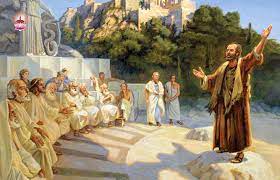
Established in Christ
As we begin Romans 15, it seems that Paul is continuing his thoughts from chapter 14, especially beginning at Rom. 14:19, encouraging the church to pursue peace and edification for each other. Living and declaring the Word of God, spreading the Good News of the Gospel worldwide, is too vital a mission to let human faults and failings hamper its progress. As we can we can see from Paul’s transitional “Now…” in Rom. 15:5, Paul is![]() preparing to make his “closing statement” for this great book of the Bible that teaches us the rich doctrinal truths of Salvation by Grace. That one theme sums up the book: Salvation, the grace of God in spite of man’s sin, providing Justification, declaring the believer to be righteous, empowering that sinner to be an instrument of God for righteousness, and making him a “new creation” that will reign with Christ for eternity. So Great a Salvation!
preparing to make his “closing statement” for this great book of the Bible that teaches us the rich doctrinal truths of Salvation by Grace. That one theme sums up the book: Salvation, the grace of God in spite of man’s sin, providing Justification, declaring the believer to be righteous, empowering that sinner to be an instrument of God for righteousness, and making him a “new creation” that will reign with Christ for eternity. So Great a Salvation!
Before he gets to that transition, however, he concludes the immediate context of being committed to personal convictions by doing so with grace. God’s work of grace in us (Eph. 2:8-9) should be expressed constantly in our relationships with each other in the church (Rom. 15:5-6). There are no winners and losers, but instead we are all sinners saved by grace, each seeking to honor Christ as best as they know how. Some more mature and stable in their faith in Christ, some still having growing pains, but all together in one fellowship. The stronger one bears up the weaker, carrying the weight of life challenges (Gal. 6:2; Phil. 2:2-8). We please each other, not ourselves, build each other up, minister together in the body of Christ, Who is Himself the best example of self-less living. We live “like-minded” (Rom. 15:5). Note that this is why we need to have a “transformed” mind as stated in Rom. 12:2.
As Paul has done throughout his writing this letter, he has the whole document carefully thought out, from beginning to end. He now moves towards closure of the letter, building on the foundation of our being like-minded in Christ in order to glorify God (Rom. 15:5-6). With the summary power only Paul himself could muster, he brings the total mass of doctrine covered in his letter to this grand closing (which is not actually the closing until Rom. 16:17). He lays on us the mantle of living Christ through all of the challenges we might face in life. We all encounter different challenges, some more or less in quantity, some more or less severe. We all together must “live Christ” in front of and with our brothers and sisters in Christ. Paul knows, as he states in Rom. 16:25, that God will establish us in our faith and accomplish His great plan through us.

Established by Building Each Other Up
Romans 15:4-13 talks about strengthening. As believers together in a church fellowship have the “same mind”, agreeing together about doctrine, we proceed to stand in our faith. We exercise perseverance and encouragement, communicating a single clear![]() message.
message.  We are also strengthened by Scripture. Paul has been teaching about love and liberty, and this is the practical conclusion of his thoughts about that. Note the several quotes from the Old Testament. Paul again shows his grasp of the Hebrew Scriptures as he refers to 2 Sam. 22:50; Deut. 32:43; Psa. 117:1; and Isa. 11:10 (note that the “root of Jesse” is the Messiah). He applies these rich OT texts to our Christian life experience. God’s divine purpose in accomplishing His plan through His faithful followers, Jew or Gentile, exercising believing faith. In all situations, the primary goal is to give praise to God. God’s praise is always the end goal – note elsewhere in Romans where Paul concludes his thoughts with praise: Rom. 8:31-39; 11:33-36.
We are also strengthened by Scripture. Paul has been teaching about love and liberty, and this is the practical conclusion of his thoughts about that. Note the several quotes from the Old Testament. Paul again shows his grasp of the Hebrew Scriptures as he refers to 2 Sam. 22:50; Deut. 32:43; Psa. 117:1; and Isa. 11:10 (note that the “root of Jesse” is the Messiah). He applies these rich OT texts to our Christian life experience. God’s divine purpose in accomplishing His plan through His faithful followers, Jew or Gentile, exercising believing faith. In all situations, the primary goal is to give praise to God. God’s praise is always the end goal – note elsewhere in Romans where Paul concludes his thoughts with praise: Rom. 8:31-39; 11:33-36.
![]() Bible Study Journal
Bible Study Journal
-
-
- This selfless ministry of edification that we have to one another merits a great deal of thought and study, so you are encouraged to pursue that in your own Bible study time. Use these verses as a start: 1 Cor. 10:23-24; Eph. 4:28; Phil. 2:2-5; 1 Pet. 5:1-4.
- Why do you think Paul chose to follow Rom. 15:3 with verse 4?
- In Rom. 16:25, what is meant by “establish”? What other word would you suggest could be used (check other versions)?
-
Romans 15:7-13, Being Established by Being a Servant
Christ’s example as a servant is given as our singular model. We’re reminded of the extent of His “servitude” in Phil. 2:5-8. He had a purpose in doing that – to go to the Cross. We also have a reason for being a servant: to bring Christ and His salvation to those we serve. Who do we serve? Recall Jesus responding to the lawyer’s question, “Who is my neighbor?” (Luke 10:29–37). This was in response to their agreeing on a summary of the OT law being to love the Lord with all your heart, and love your neighbor as yourself. That interaction with Jesus would have caused any of us to need to stop and think! The model of godliness, perfected in Christ, is to love our neighbor. Paul concludes this challenge by reminding us of the core themes he mentions often in his letters of joy, peace and hope. We know we find those things for our own life, and we can point our fellow earth-dwellers to that same Fountain of Living Water.
serve. Who do we serve? Recall Jesus responding to the lawyer’s question, “Who is my neighbor?” (Luke 10:29–37). This was in response to their agreeing on a summary of the OT law being to love the Lord with all your heart, and love your neighbor as yourself. That interaction with Jesus would have caused any of us to need to stop and think! The model of godliness, perfected in Christ, is to love our neighbor. Paul concludes this challenge by reminding us of the core themes he mentions often in his letters of joy, peace and hope. We know we find those things for our own life, and we can point our fellow earth-dwellers to that same Fountain of Living Water.
![]() Bible Study Journal
Bible Study Journal
- Phil. 2:5-8 reminds us of how Jesus Christ was a servant to bring us salvation. What are some ways that we can apply His being a servant to our life? Consider how John 13:1-17 guides our thinking about this. Click here to read a good article on this subject from gotquestions.org.
Romans 15:14-21, Being Established in Ministry
In this passage, Paul transitions into a personal sharing of thoughts about ministry and plans for how he will proceed. Paul is likely 55-60 years old, he is probably beginning to wear out through all his travels that included a great deal of walking and ship voyages. He is currently guiding a collection effort with all the churches he has ministered to. The collection is for the needs of the many poor members of the Jerusalem church, an effort that originated with the Antioch church. Once that is delivered, he expects to head back westward,  spend time in Rome and then on to Spain (there are good historical references that indicate he did make it there). He now expresses a glimpse into his future plans, his “long view” of where God is leading next. In Rom. 15:14-21, he expands on his perspective of ministry, his mission to reach Gentiles with the Gospel, his priority in glorifying Christ with everything he does. Note that Christians should “make plans”, short and long range, but all of our plans should be based on our understanding of God’s biblical and personal purposes for our life. He has seen his ministry include precious longer pastoral ministries, many great opportunities to declare Christ in open forums, and Spirit-powered “signs and wonders” as he has travelled from Jerusalem all the way west to Illyricum (northwest of Macedonia, 1400 miles from Jerusalem) and then back to Jerusalem and Antioch, not once but in two different journeys, and now engaged on a third missions journey. As he stated in Rom. 1:14-15, as God’s servant he is debtor to all, and that includes his expectation to preach in Rome and to continue to preaching to those who have never heard about Christ (Rom. 15:20).
spend time in Rome and then on to Spain (there are good historical references that indicate he did make it there). He now expresses a glimpse into his future plans, his “long view” of where God is leading next. In Rom. 15:14-21, he expands on his perspective of ministry, his mission to reach Gentiles with the Gospel, his priority in glorifying Christ with everything he does. Note that Christians should “make plans”, short and long range, but all of our plans should be based on our understanding of God’s biblical and personal purposes for our life. He has seen his ministry include precious longer pastoral ministries, many great opportunities to declare Christ in open forums, and Spirit-powered “signs and wonders” as he has travelled from Jerusalem all the way west to Illyricum (northwest of Macedonia, 1400 miles from Jerusalem) and then back to Jerusalem and Antioch, not once but in two different journeys, and now engaged on a third missions journey. As he stated in Rom. 1:14-15, as God’s servant he is debtor to all, and that includes his expectation to preach in Rome and to continue to preaching to those who have never heard about Christ (Rom. 15:20).
![]() Bible Study Journal
Bible Study Journal
-
-
-
- In Rom. 15:14, what qualities does Paul observe about the believers in Rome? How are those qualities observable in you?
- Per Rom. 15:19, why were signs and wonders important alongside the ministries of the other apostles? (See Acts 5:12-16)
- How should Rom. 15:20 impact the planning of church missions programs?
-
-
Romans 15:22-33, Being Established for Future Plans
Now Paul begins to speak more personally to the believers in the church at Rome with more specific details of where he is headed. He is still “hindered”, not allowed by God or by external circumstances to make it to Rome yet, but he sees his mission activity coming to completion where he currently was, that is in Corinth during his third missions journey. He has been traveling around in Macedonia and Achaia in order to give many churches the opportunity to share in the offering, but now he is making plans to travel all the way to Rome, as God allows, after first going to Jerusalem. Interesting that in v28, he shares plans to have a trip to Spain, and on the way he will stop to spend time in Rome.
Paul here places on the Roman believers the request for prayer for him as he travels and ministers, as they will be “striving” with him in prayer as he goes forth. He acknowledges that there are many Judaizers in Judea who will try to destroy his ministry. Indeed, as he goes to Jerusalem and is arrested, he will spend two years in a Roman prison in Caesarea. Then he will be transported by a long, dangerous ship voyage with Roman Guards to Rome to appear before Caesar, which results in two more years of house arrest. So, his method of getting to spend time with the Roman church was not what he expecte. Paul’s resolve is to get to Jerusalem first, at all costs. Compare his thoughts in Phil. 1:19-26. Note that the delay for Paul to actually get to Rome worked in God’s plan for Christians in Rome and through the ages since then for us all to have this great epistle!
Note that careful planning is appropriate for the Christian, as he seeks to follow God’s will and leading. God expects us to make God-honoring choices and decisions as we go through life. The key is to see your life and ministry as a “priestly” activity, standing before people ministering and speaking for God. Note that there is also a close relationship between churches at home and the missions enterprise – they strengthen each other.
Bible Study Journal![]()
- To what extent should a Christian “make plans” for Christian life and ministry? What things would you recommend the Christian do before starting to make those plans? To what extent should our plans be integrated with God’s will for our life? What should the Christian do if the plans fail?
-
- Paul is a great example of “stepping out in faith”. What verses can you recommend about making trusting God to lead you as you trust Him?
-
Romans 16, Greetings and Final Admonition
In Romans 16:1-16, Paul expresses close relationships and words of encouragement to several people in the Rome church. Indeed, there are as many as 35 names mentioned, 9 are people with him in Corinth, so 26 were in Rome. It’s interestng to note that Paul did not start the church in Rome, and he hadn’t even been there yet. But still, he knew many people in the church whom he had worked with in ministry through the 20 years of missions travel he had already done, and even those he didn’t know personally he knew much about. He was a thorough leader. We are reminded by these remarks and references to the character of his friends that he has a warm and tender heart. The deep, solid doctrinal character of this letter is thus given an entirely different tone with that warm  context. Everything he has declared in these chapters is delivered with heartfelt compassion. It is interesting to note the inference of much communication that was occurring between various parties, knowledge of ministry activities that was being carried out in other places. There was a very active “pony express” type of Roman courier organization that was active throughout the Roman Empire, enabled greatly the famous “Roman Road” system, and this process benefitted the Church greatly.
context. Everything he has declared in these chapters is delivered with heartfelt compassion. It is interesting to note the inference of much communication that was occurring between various parties, knowledge of ministry activities that was being carried out in other places. There was a very active “pony express” type of Roman courier organization that was active throughout the Roman Empire, enabled greatly the famous “Roman Road” system, and this process benefitted the Church greatly.
In Romans 16:17-27, Paul now picks up on the introductory thought of 15:5, “Now, may the the God of patience and comfort…”. He says “Now I urge you…” and he proceeds to give a final admonition to close the book of Romans. This passage begins with a warning in verses 17-20 to never let down their guard (or ours) watching out for doctrinal falsehood and unrighteous practices. Then in verses 21-24, Paul specifically greets the men with him in Corinth.
As the letter closes, Rom. 16:25-27 give us one of the strongest benedictions in the Bible, a major doxology that is often quoted in our churches today – “Now to Him Who is able to establish you… to God, alone wise, be glory through Jesus Christ forever.”
Paul closes this book with three noble gestures, all three of which can be taken as guides for our own life:
- Commendations and greetings to some special friends
- A final firm admonition to be faithful to our faith with no compromise
- An inspiring benediction that expresses our deep allegiance and privilege as God’s faithful followers.




